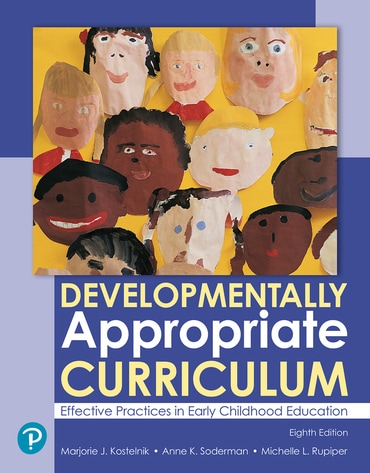
Developmentally Appropriate Curriculum: Best Practices in Early Childhood Education, 8th edition
Published by Pearson (May 21, 2024) © 2025
- Marjorie J. Kostelnik |
- Anne K. Soderman |
- Alice P. Whiren |
- Michelle L. Rupiper |
Switch content of the page by the Role togglethe content would be changed according to the role
Key features
Features of Pearson+ eTextbook for the 8th Edition
- NEW: Video Examples, including authentic classroom videos and interviews with experts in the field, expand on principles or concepts in each chapter, helping put the reading into context.
- NEW: Chapter-opening links correlate the chapter contents to the specific National Association for the Education of Young Children standards covered.
- NEW: You’re the Observer video analysis exercises encourage critical thinking in responding to questions about teaching, development and learning.
- NEW: Artifacts promote deeper understanding with links to in-depth case studies, research articles, student work, and lesson plans. Associated questions guide students to think and make decisions like a teacher.
- The Interactive Glossary lets students quickly build their professional vocabulary as they read.
Table of contents
Part 1: Foundations of Early Childhood Education
- Developmentally Appropriate Practice
- Teaching and Learning in Developmentally Appropriate Programs
Part 2: Setting the Stage for Learning
- Planning and Implementing Effective Small-Group Activities
- Planning and Implementing Effective Group-Time Activities
- Organizing Space and Materials
- Child Guidance in Early Childhood Classrooms
- Strengthening Developmentally Appropriate Programs Through Family Engagement
Part 3: The Curriculum
- The Aesthetic Domain
- The Affective Domain
- The Cognitive Domain
- The Language Domain
- The Physical Domain
- The Social Domain
Part 4: Integrating Curriculum
- Organizing Children’s Learning Over Time
APPENDICES
- Sample Lesson Plans
- Field Trips
- The Big, Big Turnip
